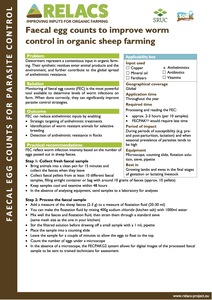{Tool} Faecal egg counts to improve worm control in organic sheep farming (RELACS Practice Abstract). Creator(s): Chylinski, Caroline; Bowles, Liz; McCulloch, Coleen; Allamand, Ana and Athanasiadou, Spiridoula. Issuing Organisation(s): FiBL - Research Institute of Organic Agriculture, IFOAM Organics Europe, SRUC - Scotland's Rural College, Soil Association Certification, Soil Association Scotland. RELACS Practice abstract, no. 04. (2020)
![[thumbnail of COVER_relacs.jpg]](/39609/2.hassmallThumbnailVersion/COVER_relacs.jpg)  Preview |
Image (JPEG)
- Cover Image
- English
464kB |
|
PDF
- Published Version
- English
(Faecal egg counts to improve worm control in organic sheep farming)
217kB |
Document available online at: https://relacs-project.eu/wp-content/uploads/2021/05/RELACS_PA_04_FEC_SRUC_SA_final.pdf
Summary
The steps needed for monitoring faecal egg count are outlined in this practice abstract. Carrying out your own tests gives instant results and allows for greater flexibility in monitoring gastrointestinal nematode infections throughout the year. This may be especially important around lambing, when a greater number of transmission stages are on pasture. The costs of the test or equipment is quickly recouped from improved monitoring and management of parasites.
The information presented in this abstract is relevant for all sheep farmers looking to reduce the use of deworming agents, which is especially relevant in organic farming.
| EPrint Type: | Practice tool |
|---|---|
| Teaser: | Improve worm control in organic sheep farming with feacal egg counting. |
| What problem does the tool address?: | Dewormers represent a contentious input in organic farming. Their synthetic residues enter animal products and the environment, and further contribute to the global spread of anthelmintic resistance. |
| What solution does the tool offer?: | Monitoring of faecal egg counts can reduce the need for anthelmintic inputs. |
| Country: | Belgium, Switzerland, United Kingdom of Great Britain and Northern Ireland |
| Type of Practice Tool: | Practice abstracts |
| Keywords: | Animal husbandry, Animal health, Small ruminants, sheep, parasite control |
| Agrovoc keywords: | Language Value URI English animal husbandry http://aims.fao.org/aos/agrovoc/c_8532 English animal health http://aims.fao.org/aos/agrovoc/c_431 English small ruminants http://aims.fao.org/aos/agrovoc/c_32579 English sheep http://aims.fao.org/aos/agrovoc/c_7030 English parasite control http://aims.fao.org/aos/agrovoc/c_e9cceff4 |
| Subjects: | Animal husbandry Animal husbandry > Health and welfare |
| Research affiliation: | European Union > Horizon 2020 > RELACS Switzerland > FiBL - Research Institute of Organic Agriculture Switzerland > Animal > Small ruminants UK > Scottish Rural Colleges (SRUC - previously SAC) UK > Soil Association |
| Horizon Europe or H2020 Grant Agreement Number: | 773431 |
| Related Links: | https://relacs-project.eu/, https://organic-farmknowledge.org/tool/39609, https://www.facebook.com/organicfarmknowledge/posts/219728523273123, https://twitter.com/farm_knowledge/status/1374706391127048202 |
| Project ID: | ofk |
| Deposited By: | Forschungsinstitut für biologischen Landbau, FiBL |
| ID Code: | 39609 |
| Deposited On: | 22 Mar 2021 11:01 |
| Last Modified: | 08 Aug 2023 09:01 |
| Document Language: | English |
| Status: | Published |
Repository Staff Only: item control page


